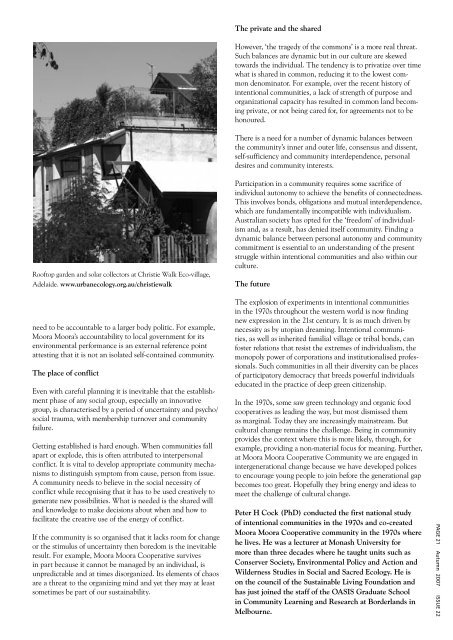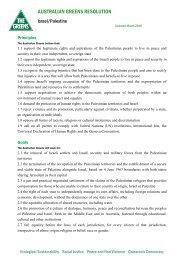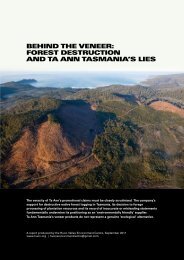news & views - Australian Greens
news & views - Australian Greens
news & views - Australian Greens
Create successful ePaper yourself
Turn your PDF publications into a flip-book with our unique Google optimized e-Paper software.
Rooftop garden and solar collectors at Christie Walk Eco-village,<br />
Adelaide. www.urbanecology.org.au/christiewalk<br />
need to be accountable to a larger body politic. For example,<br />
Moora Moora’s accountability to local government for its<br />
environmental performance is an external reference point<br />
attesting that it is not an isolated self-contained community.<br />
The place of conflict<br />
Even with careful planning it is inevitable that the establishment<br />
phase of any social group, especially an innovative<br />
group, is characterised by a period of uncertainty and psycho/<br />
social trauma, with membership turnover and community<br />
failure.<br />
Getting established is hard enough. When communities fall<br />
apart or explode, this is often attributed to interpersonal<br />
conflict. It is vital to develop appropriate community mechanisms<br />
to distinguish symptom from cause, person from issue.<br />
A community needs to believe in the social necessity of<br />
conflict while recognising that it has to be used creatively to<br />
generate new possibilities. What is needed is the shared will<br />
and knowledge to make decisions about when and how to<br />
facilitate the creative use of the energy of conflict.<br />
If the community is so organised that it lacks room for change<br />
or the stimulus of uncertainty then boredom is the inevitable<br />
result. For example, Moora Moora Cooperative survives<br />
in part because it cannot be managed by an individual, is<br />
unpredictable and at times disorganized. Its elements of chaos<br />
are a threat to the organizing mind and yet they may at least<br />
sometimes be part of our sustainability.<br />
The private and the shared<br />
However, ‘the tragedy of the commons’ is a more real threat.<br />
Such balances are dynamic but in our culture are skewed<br />
towards the individual. The tendency is to privatize over time<br />
what is shared in common, reducing it to the lowest common<br />
denominator. For example, over the recent history of<br />
intentional communities, a lack of strength of purpose and<br />
organizational capacity has resulted in common land becoming<br />
private, or not being cared for, for agreements not to be<br />
honoured.<br />
There is a need for a number of dynamic balances between<br />
the community’s inner and outer life, consensus and dissent,<br />
self-sufficiency and community interdependence, personal<br />
desires and community interests.<br />
Participation in a community requires some sacrifice of<br />
individual autonomy to achieve the benefits of connectedness.<br />
This involves bonds, obligations and mutual interdependence,<br />
which are fundamentally incompatible with individualism.<br />
<strong>Australian</strong> society has opted for the ‘freedom’ of individualism<br />
and, as a result, has denied itself community. Finding a<br />
dynamic balance between personal autonomy and community<br />
commitment is essential to an understanding of the present<br />
struggle within intentional communities and also within our<br />
culture.<br />
The future<br />
The explosion of experiments in intentional communities<br />
in the 1970s throughout the western world is now finding<br />
new expression in the 21st century. It is as much driven by<br />
necessity as by utopian dreaming. Intentional communities,<br />
as well as inherited familial village or tribal bonds, can<br />
foster relations that resist the extremes of individualism, the<br />
monopoly power of corporations and institutionalised professionals.<br />
Such communities in all their diversity can be places<br />
of participatory democracy that breeds powerful individuals<br />
educated in the practice of deep green citizenship.<br />
In the 1970s, some saw green technology and organic food<br />
cooperatives as leading the way, but most dismissed them<br />
as marginal. Today they are increasingly mainstream. But<br />
cultural change remains the challenge. Being in community<br />
provides the context where this is more likely, through, for<br />
example, providing a non-material focus for meaning. Further,<br />
at Moora Moora Cooperative Community we are engaged in<br />
intergenerational change because we have developed polices<br />
to encourage young people to join before the generational gap<br />
becomes too great. Hopefully they bring energy and ideas to<br />
meet the challenge of cultural change.<br />
Peter H Cock (PhD) conducted the first national study<br />
of intentional communities in the 1970s and co-created<br />
Moora Moora Cooperative community in the 1970s where<br />
he lives. He was a lecturer at Monash University for<br />
more than three decades where he taught units such as<br />
Conserver Society, Environmental Policy and Action and<br />
Wilderness Studies in Social and Sacred Ecology. He is<br />
on the council of the Sustainable Living Foundation and<br />
has just joined the staff of the OASIS Graduate School<br />
in Community Learning and Research at Borderlands in<br />
Melbourne.<br />
PAGE 21 Autumn 2007 ISSUE 22












